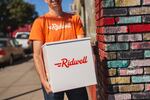The Seattle-based recycling company Ridwell has expanded its home-pickup service to Portland, collecting things like plastic bags, bubble wrap, batteries, light bulbs and clothing that aren’t allowed in curbside recycling bins.
While various drop-off sites around the city will also recycle or repurpose these items, Ridwell is offering an alternative. For a monthly fee that ranges from $12-$16 a month, the company will collect these items from your house.

Ridwell, based in Seattle, says it is developing a customer base in Portland, where residents are willing to pay to have hard-to-recycle items picked up at their homes. The alternative is to take these items, like lightbulbs and plastic film, to drop-off sites.
Ridwell / Ridwell
Company founder and CEO Ryan Metzger said he found out firsthand how many trips it takes to recycle as much as possible when he and his son Owen started gathering things from their house and taking them to drop sites around Seattle.
“It just began as a way to kind of clean up our house and do it in a responsible way,” he said. “You could drive yourself crazy going all over town taking this to there and your clothes to there. Really what we saw was lots of interest in making it really really easy for someone else to kind of do those trips for you.”
Ridwell delivers the items it collects to recyclers or places that can reuse them. In Portland, the company is delivering reusable items to Rose Haven shelter, PDX Diaper Bank and Free Geek, for example.
“We’re always looking for reuse first,” Metzger said. “And then if we can’t find that we’re looking for recyclers that are out there that can keep things from landfills instead, recycle them in a new thing.”
Plastic wrap and bags go to a facility in Nevada that turns them into a composite that can be made into decking material, Metzger said. Every two weeks the company announces an additional “featured item” that it will collect in the next pickup.
“Something like eyeglasses you may not have to get rid of, you know, every couple weeks, but you might have it once a year,” he said. “There are also seasonal ones that we mix in there like holiday light strands.”
Metzger said the company charges fees because it doesn’t make enough money from the items it collects to cover its operational costs. Ridwell expanded its service to Portland in November and now has more than 2,000 customers in the city. Metzger said he’s hoping to expand the service to more zip codes in the Portland metro area this year. Ridwell serves about 17,000 customers in Seattle.
Last year, the company recycled or repurposed 900,000 pounds of waste in Seattle, including 300,000 pounds of the plastic film that’s not accepted by curbside recycling programs.
For those who want to do their own recycling and repurposing trips in Portland, Metro’s Recycling Information Center has a hotline, online experts and a searchable database of recycling drop sites that can help Portlanders find the right places to drop off the items that aren’t allowed in curbside recycling bins.



